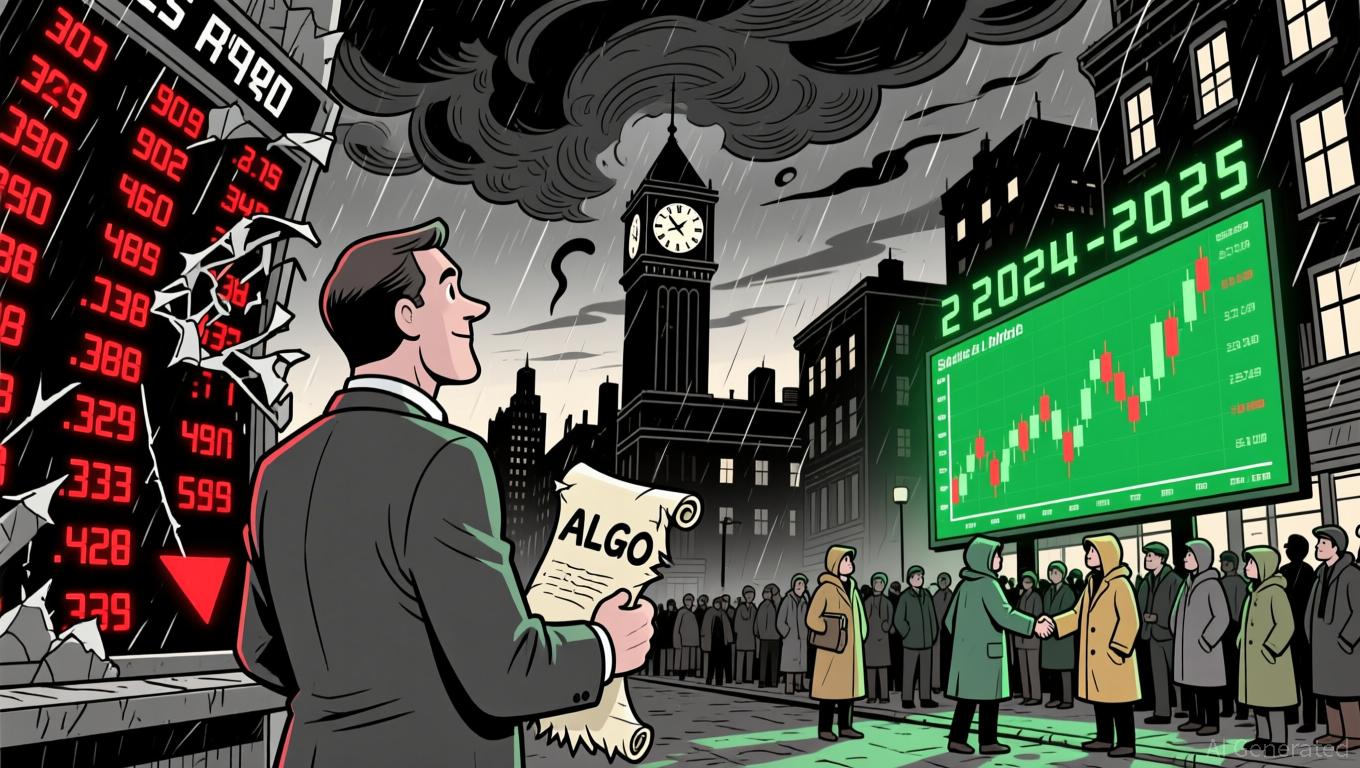The ChainOpera AI Token Crash: An Urgent Warning for Cryptocurrency Projects Powered by AI
- ChainOpera AI's COAI token collapsed 96% in late 2025, exposing systemic risks in AI-driven DeFi ecosystems. - Centralized governance (10 wallets controlled 87.9% supply) and misaligned incentives exacerbated panic selling during crises. - Technical flaws included untested AI models with 270% increased vulnerabilities and inadequate smart contract security audits. - Regulatory shifts like the GENIUS Act compounded liquidity challenges, highlighting the need for compliance-ready AI crypto projects. - Inve
Governance Failures: Centralization and Incentive Misalignment
Centralization within the governance system was a core issue behind COAI’s downfall. BeInCrypto’s investigation revealed that
The governance approach also failed to effectively prevent conflicts of interest. For example, while staking tokens was meant to democratize voting, the reality was that a handful of wallets could still dictate outcomes. This misalignment of incentives became even more problematic when algorithmic stablecoins like

Technical Vulnerabilities: AI Models and Smart Contract Risks
Technical weaknesses further undermined ChainOpera AI’s already fragile governance. Despite assurances of secure smart contracts, the platform was plagued by subpar application security and insufficient infrastructure protections, as detailed in a Kryll blog post
During this time, autonomous AI systems also saw a 67% rise in misconfigurations and logical mistakes,
Regulatory Pressures: Compliance Costs and Uncertainty
Regulatory changes added further complications for ChainOpera AI.
Lessons for Investors: Prioritizing Resilience Over Innovation
The COAI incident imparts three major takeaways for those investing in AI-powered crypto ventures:
1. Insist on Decentralized Governance: Projects where a small number of wallets control most tokens are inherently risky. Investors should look for protocols with wide, fair token distribution and clear, open DAO structures.
2. Examine Technical Audits Closely: Both AI models and smart contracts require thorough, independent security reviews. COAI’s lack of such protections left it open to systemic breakdowns.
3. Evaluate Regulatory Preparedness: Regulatory changes can quickly destabilize projects. Investors should assess how well a project adapts to shifting compliance demands and test its ability to withstand regulatory shocks.
Conclusion
The downfall of the ChainOpera AI token stands as a warning for the DeFi community. While AI has the potential to revolutionize blockchain, its adoption must be paired with strong governance, transparent technical standards, and proactive regulatory planning. For investors, the focus should move from pursuing novelty to ensuring that projects are built to endure systemic disruptions. As the crypto landscape evolves, those who learn from these lessons will be better equipped to manage the risks associated with AI-driven finance.
Disclaimer: The content of this article solely reflects the author's opinion and does not represent the platform in any capacity. This article is not intended to serve as a reference for making investment decisions.
You may also like
South Korea's Approach to Crypto Regulation Could Become a Model for Global Stability and Innovation
- South Korea's Digital Asset Basic Act (2025) establishes a unified regulatory framework for crypto assets, targeting stablecoins and cross-border transactions. - Stablecoin issuers face licensing, reserve requirements, and FSC oversight, while foreign VASPs must register and report transactions to combat forex crimes. - The reforms aim to balance innovation with financial stability, potentially attracting investment but increasing compliance costs for firms and scrutiny for investors. - As Asia's major c

Ethereum News Update: Ethereum Whale Makes $1.33B Leveraged Move—Sign of Confidence or Risky Overextension?
- Ethereum whale "66kETHBorrow" injected $1.33B into ETH via leveraged Aave borrowing, stabilizing prices near $3,500. - Whale's 385k ETH holdings and $270M Aave-funded purchases signal institutional confidence despite market volatility. - Analysts note leveraged accumulation often precedes recoveries, though risks include amplified losses if prices correct further. - Market remains divided as whale's strategy contrasts with $183M Ethereum ETF outflows and key support/resistance levels.
Algorand (ALGO) Falls 54.47% Over the Past Year as Company Developments and Market Challenges Persist
- Algorand (ALGO) fell 54.47% in one year due to macro pressures and lack of product milestones. - Biopharma firms Aligos and Allogene announced stock incentives/insider transactions unrelated to crypto. - Prolonged crypto bear market and weak adoption left ALGO vulnerable to sector-wide declines. - Investors await Algorand Foundation updates amid ongoing volatility and uncertain valuation metrics.

Lloyds Completes Curve Purchase Amid Shareholder Disputes Over Valuation
- Lloyds acquires Curve for £120M amid shareholder backlash over undervaluation and governance concerns. - IDC Ventures, Curve's largest investor, rejects the deal via legal action, disputing transparency and valuation. - Lloyds aims to integrate Curve's payment tech to compete with Apple/Google Pay amid EU regulatory shifts. - The acquisition reflects fintech consolidation as banks exploit lower valuations to fast-track digital infrastructure. - Legal challenges and governance disputes could delay the dea
